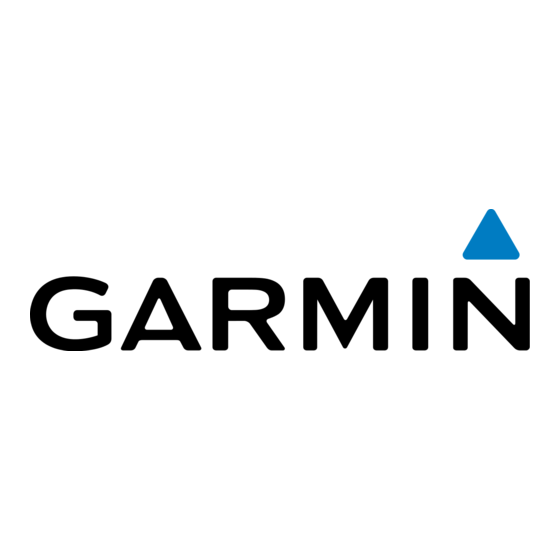Garmin D2 BRAVO TITANIUM 소유자 매뉴얼 - 페이지 29
{카테고리_이름} Garmin D2 BRAVO TITANIUM에 대한 소유자 매뉴얼을 온라인으로 검색하거나 PDF를 다운로드하세요. Garmin D2 BRAVO TITANIUM 36 페이지.

Contact your local waste disposal department to properly
recycle the batteries.
Replacing the Heart Rate Monitor Battery
1
Remove the sleeve
from the heart rate monitor module.
2
Use a small Phillips (00) screwdriver to remove the four
screws on the front of the module.
3
Remove the cover and battery.
4
Wait 30 seconds.
5
Insert the new battery under the two plastic tabs
positive side facing up.
NOTE: Do not damage or lose the O-ring gasket.
The O-ring gasket should remain around the outside of the
raised plastic ring.
6
Replace the front cover and the four screws.
Observe the orientation of the front cover. The raised screw
should fit in the matching raised screw hole on the front
cover.
NOTE: Do not overtighten.
7
Replace the sleeve.
After you replace the heart rate monitor battery, you may need
to pair it with the device again.
Appendix
Data Fields
%FTP: The current power output as a percentage of functional
threshold power.
%HRR: The percentage of heart rate reserve (maximum heart
rate minus resting heart rate).
10s Avg. Power: The 10-second moving average of power
output.
10s Avg Balance: The 10-second moving average of the left/
right power balance.
24-Hour Max.: The maximum temperature recorded in the last
24 hours.
24-Hour Min.: The minimum temperature recorded in the last
24 hours.
30s Avg. Power: The 30-second moving average of power
output.
30s Avg Balance: The 30-second moving average of the left/
right power balance.
3s Avg. Balance: The three-second moving average of the left/
right power balance.
3s Avg. Power: The 3-second moving average of power output.
500m Pace: The current swimming pace per 500 meters.
Ambient Press.: The uncalibrated ambient pressure.
Average HR: The average heart rate for the current activity.
Average Pace: The average pace for the current activity.
Appendix
CAUTION
with the
Average Power: The average power output for the current
activity.
Average SWOLF: The average swolf score for the current
activity. Your swolf score is the sum of the time for one length
plus the number of strokes for that length
Terminology, page
8). In open water swimming, 25 meters is
used to calculate your swolf score.
Avg. %HRR: The average percentage of heart rate reserve
(maximum heart rate minus resting heart rate) for the current
activity.
Avg. Ascent: The average vertical distance of ascent since the
last reset.
Avg. Balance: The average left/right power balance for the
current activity.
Avg. Cadence: Cycling. The average cadence for the current
activity.
Avg. Cadence: Running. The average cadence for the current
activity.
Avg. Descent: The average vertical distance of descent since
the last reset.
Avg. GCT Bal.: The average ground contact time balance for
the current session.
Avg. Lap Time: The average lap time for the current activity.
Avg. Speed: The average speed for the current activity.
Avg. Stride Len.: The average stride length for the current
session.
Avg. Strk/Len: The average number of strokes per length
during the current activity.
Avg. Strk Rate: The average number of strokes per minute
(spm) during the current activity.
Avg. Vert. Osc.: The average amount of vertical oscillation for
the current activity.
Avg. Vert. Ratio: The average ratio of vertical oscillation to
stride length for the current session.
Avg 500m Pace: The average swimming pace per 500 meters
for the current activity.
Avg Dist Per Stk: The average distance traveled per stroke
during the current activity.
Avg GCT: The average amount of ground contact time for the
current activity.
Avg HR %Max.: The average percentage of maximum heart
rate for the current activity.
Balance: The current left/right power balance.
Baro. Pressure: The calibrated current pressure.
Bearing: The direction from your current location to a
destination. You must be navigating for this data to appear.
Cadence: Cycling. The number of revolutions of the crank arm.
Your device must be connected to a cadence accessory for
this data to appear.
Cadence: Running. The steps per minute (right and left).
Calories: The amount of total calories burned.
Compass Hdg.: The direction you are moving based on the
compass.
Course: The direction from your starting location to a
destination. Course can be viewed as a planned or set route.
You must be navigating for this data to appear.
Dest. Location: The position of your final destination.
Dest. Name: The last point on the route to the destination. You
must be navigating for this data to appear.
Dist. Per Stroke: The distance traveled per stroke.
Dist. Remaining: The remaining distance to the final
destination. You must be navigating for this data to appear.
(Swim
25
